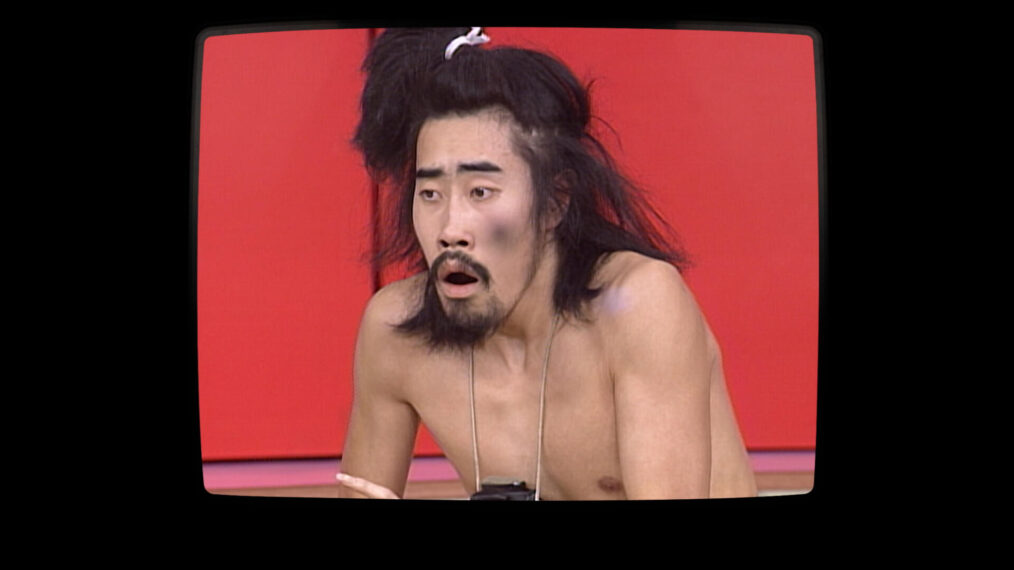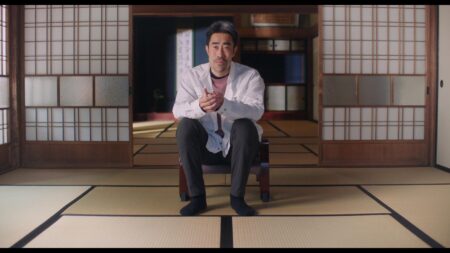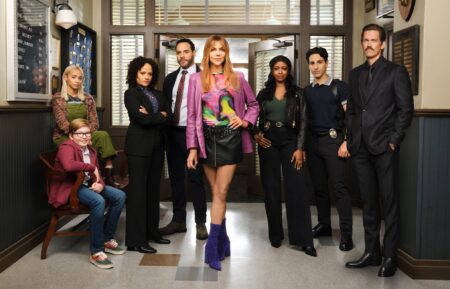‘The Contestant’ Director Dishes on Bringing Nasubi Back to Screens After ‘Denpa Shonen’ for This Wild New Hulu Documentary

When Tomoaki Hamatsu aka Nasubi first auditioned for a game show run by famed Japanese producer Toshio Tsuchiya, he wanted to be a comedian. What he didn’t know is that people would be laughing at him for all the wrong reasons — and he wouldn’t even know it. Now, Hulu’s riveting documentary The Contestant aims to show the horror behind all of the humor.
In 1998, Nasubi’s name was randomly chosen during the audition, and he was whisked away to a small, empty apartment and instructed to take all of his clothes off. He would then spend the next year and three months in that condition, surviving only off of the prizes he received from mail-order contests until he won ¥1 million worth of prizes. Though he knew there was a camera in the room, he didn’t know it was feeding a daily broadcast of Denpa Shonen: A Life in Prizes or that millions of people around the country were hooked on the footage of his eggplant-covered bottom prancing around the room as he grew increasingly malnourished and mentally unwell.
When writer-director Clair Titley first heard of Nasubi’s story, she was instantly intrigued and realized no one had told his side of the situation before. With The Contestant, she aimed to do just that, combing through hundreds of hours of footage to present a tale that is tragic and just plain weird.
Ahead of its May 2 premiere on Hulu, TV Insider chatted with Titley about The Contestant‘s origins, what surprised her about the story and the people involved, and what she hopes audiences will take away from the film.
What drew you to the story that you wanted to make this documentary?
Clair Titley: I’d been working on another project — I do a lot of development research — and I sort of fell down one of those internet rabbit holes, when you kind of go, “That’s an interesting story” and start kind of looking at it. And then before you know it, you’ve spent far too long on on what you shouldn’t be. And I was just fascinated by it. Everything that I’d read about it was just really interesting. But I also found that everything that I’d read about it was quite simplistic — that not everything, but a lot of things were quite almost derogatory. They were quite kind of “point and laugh” at the Japanese. And they didn’t really go into Nasubi’s story, and I really wanted to learn more about him. I wanted to know why he did it. Why he didn’t leave? What happened to him afterward? How it affected him… Those are the bigger thematic questions as well. So that’s when I contacted him. That’s kind of the kind of approach that I said to him, and that’s how it all began.

Disney
Would you categorize this as a comedy or a tragedy?
I don’t know. Is it kind of Shakespearean? Can it be both? I tell you what, though, I do feel that when people watch it — it’s really interesting, watching it in a cinema because as we have done when we’ve been doing this festival run, because you hear people laugh, and then they kind of stopped themselves and feel a little bit awkward about it. And I think that’s good. As much as I don’t want people to feel uncomfortable, I kind of do with this film. It does sort of tread that line. I think it’s important that people get the comedy side of it and then … reflect on our own complicity to an extent.
One of the things that the documentary sears into your brain is how Nasubi started out trying to make people laugh. And then at the end, when he comes out of the box, he’s like, “Why are they laughing?” When you were making the arc of the story, was that something you kept in mind, that metamorphosis from “this is funny” to “this is horrifying.”
It’s a really difficult line to tread especially in the edit, and it’s a balance. … That’s what we were constantly doing in the edit: “Do we include this scene because it’s really funny, and it shows how they were doing this?”… We had lengthy conversations about how much canned laughter to include as well because there’s sometimes — when we strip everything back, there’s two key things that we did with the edit of the archive and the way in which we treated it. And one was I really wanted people to get a real sense of what it was like to watch as a Japanese person at the time.
So the VFX guy Jason Martin did an incredible job of stripping back as much of the Japanese graphics as he could — or hiding it, to be honest — because it was VHS and flat image, and there was nothing we could do, and putting on this English translation of it all as close to the front as we could possibly get to it. And the same with the voiceover thread does a brilliant job of finding that balance in interpreting the same voiceover that was there so you get a real sense of what it was like to watch with all these ridiculous noises and music.
But then on the other side of things, again, we didn’t have the rushes, the dailies, all we had was what went out on air because they hadn’t saved anything. But we really wanted people to… get a sense of what it was like for him alone in that room, what the dailies or the rushes might have looked like. So we created what we would be referring to as “fake rushes,” which were kind of where we just stripped back all the Japanese text and sound and everything and rebuilt the soundscape so that you know you can see him just alone in this in this apartment without any of the whiz bangs and commentary.
So when you decided to do this and you approached Nasubi, first of all, what was his initial reaction? And then second, was there anything about him that surprised you when you finally got to meet him and find out his perspective?
When I first contacted him, he was quite funny because … I had sort of sent him these letters that I’d had translated. And then I remember getting one back, and he’s so polite and the way that he talks that the first few sentences of the letter, I asked my neighbor who’s Japanese to translate it for me. And she started translating it and it says, “I’m so sorry, and it’s lots of apologies.” But it’s just the Japanese way of talking when you’re being very polite about it. So I was nervous. He was turning me down, but he wasn’t. He was quite receptive, I think, because I was quite open about what I wanted to do and that I wanted to make it about him.
Consent has been a really important part of the whole film from the start. And while he hasn’t had editorial control, we’ve been back and forth constantly talking about how we were going to make the film, what we wanted to do, why we were doing certain things.
He’s more humble than I then I even imagined. He’s really humble. I tell you what really surprised me… so he came over to the U.K. and had this kind of crazy sort of holiday for maybe a couple of weeks where he lived in my house, and we went on this little beach holiday with my Japanese interpreter neighbor. And I think it was one of the first times that he’d really got to unpack his story. And we had these long car journeys, we’re playing table tennis, and asking anything we want and having all this time and space to do that. And I was really surprised that he hadn’t really explored a lot of the questions that we were asking him. I think that was one of the biggest shocks to me.
Another fascinating element is the perspective of the producer [Toshio Tsuchiya]. How did you convince him to participate? And did you come into the conversation with a pre-formed opinion of him?
So actually, I didn’t have to persuade him. We kind of approached him via Nasubi. It was Nasubi who asked him to take part in the project. And I think — I mean, I can’t speak for Tsuchiya, but I feel that maybe part of his involvement was kind of making amends, in some way, he feels that that’s part of his apology. I’m making an assessment there … I can’t really speak for him, but that’s how I would think.
And it’s really hard to make a judgment because as a documentary filmmaker, you’re trying very hard not to make judgments, but obviously, you do instinctively. And in the film, I didn’t feel that I needed to kind of tell people that what he did was not ethically right or whatever. But actually, I was really surprised when I first met Tsuchiya how charming he was. I was very anxious about meeting him for the first time. But he was surprisingly charming, surprisingly reasonable, as well. … I don’t necessarily agree with [him, but] I do have a lot of respect and admiration for him for how he’s dealt with things with this project. He’s been really honest, very upfront, he’s not held back at all. He’s been very accommodating, and he’s been very supportive of this project, knowing full well how he will be seen in Western media. He’s not daft. He’s a TV producer. He’s a documentary filmmaker himself. He knew what he was getting himself into. And he’s not only got himself into it but he’s done it sort of wholeheartedly and being very brutally honest.
Looking at this, I see some elements of Black Mirror, things like Jury Duty that pull the same kind of hidden camera, the person is unaware situation. Are there any stories that you’ve seen that reminded you of this?
The only story that I saw that really reminded me of it was The Truman Show… I mean, Tsuchiya seems almost uncannily similar to Christoph, the main producer [in the film], and there’s so many elements of it that were really uncanny. I think maybe even an early treatment [of The Contestant] might have been called something like The Real Truman Show, as we were kind of developing the story. It’s such a fantastic film and such a fantastic script, and it’s just so bizarre and uncanny that it was it came out while Nasubi was in Denpa Shonen, that’s when the film came out. So there was no reference that the producers had, and actually, back then, it used to be things would come out in the U.S. and then they would come out around the rest of the world much later. And by the time it got to Fukushima, which is Nasubi’s hometown, he was actually already out of Denpa Shonen: A Life in Prizes. And he saw it in a local cinema. And he said it was quite bizarre as he sat in the cinema watching this film. It was uncanny.
I know we’ve talked before about how this isn’t meant to be instructional or pejorative, but is there any lesson that you think we should take away from this documentary?
I think I’d like people to reflect and think about how we interact with social media. I mean, this is at a time before, when it was quite hard to be famous on TV, whereas now you can walk down the street, take a photo, it’s up on the internet, everybody can see it… We overshare.
I think it’s interesting as well how it’s all moved so fast, the history of both reality TV and social media, which seems to almost be a little bit intertwined. We could be just a few years in age difference, and our experiences of both reality TV and social media are so different — what we’ve grown up with, at what point we had access to social media or a phone or saw various TV programs. It’s so different. So I think that’s what I’d like people to kind of come away with.
The Contestant, May 2, Hulu






